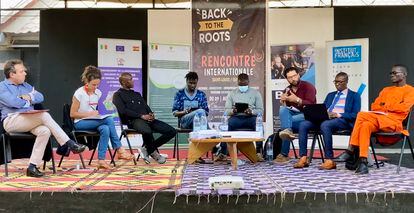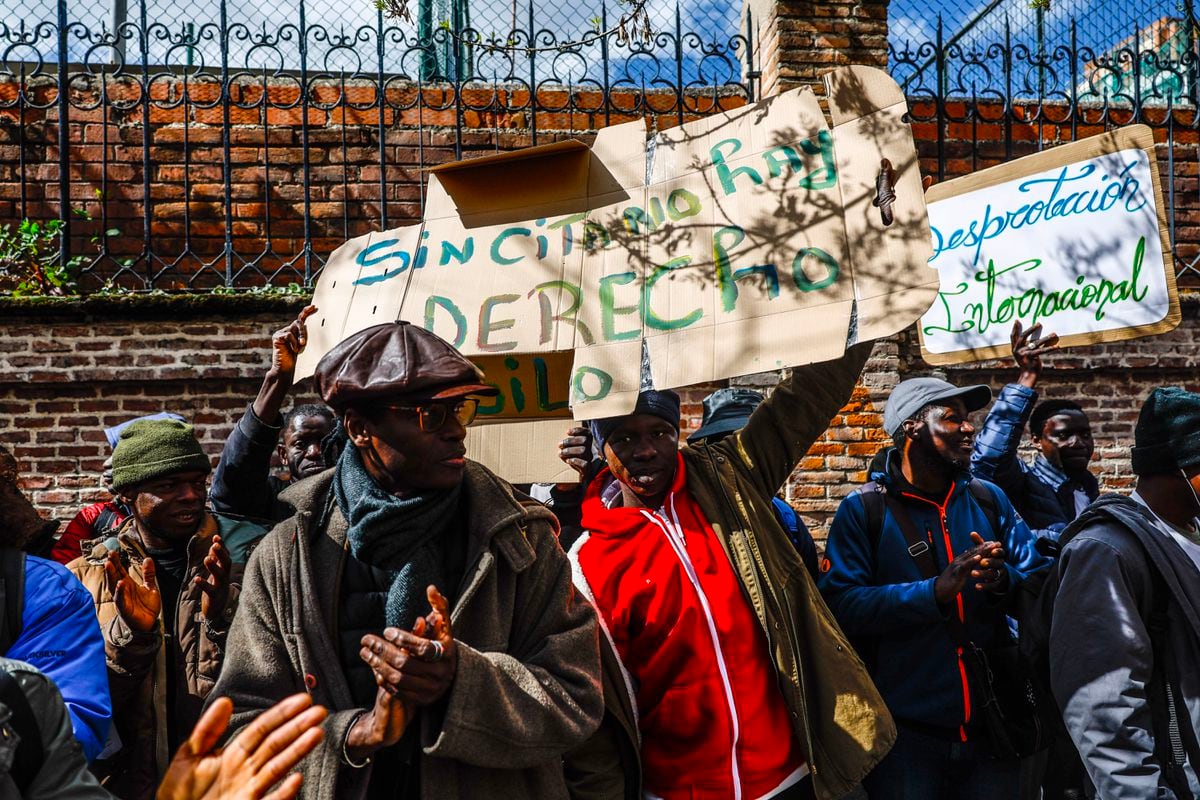In the early years of the 1920s, the Jamaican journalist Marcus Garvey, stating the injustices and violence carried out against the black population in the United States, became one of the main promoters of the
Back to Africa
movement , which urged the Afro-descendant community American to return to their continent of origin.
A century later, the Senegalese musician Birane Wane (1981, Saint Louis) cites him as a source of inspiration for his
Back to the Roots festival
,
the first edition of which took place in his hometown between May 9 and 14.
The idea of Wane -better known by his stage name
One Pac-
, was born when he arrived in Spain in 2015 and saw first-hand the conditions in which his compatriots live, knowing that many of them, after a long and dangerous journey, they lose their life on the way.
"I felt responsible," he admits.
"The festival aims to be a platform for the diaspora, to motivate the return of the Senegalese, to invite them to invest in it, contribute the new knowledge they have acquired and that we do not ignore the future of our country," he says.
Even before emigrating, the musician – a graduate in English Philology and African Literature from the Cheikh Anta Diop University in Dakar – was known for his activism in the development of his community through his neighborhood association
Meun na nek
(it is possible, in Wolof language) and the committed lyrics of his songs, such as this unofficial anthem that he dedicated to his city as the Planeta Futuro team told in the special made in 2019,
A year in Saint Louis
.
Birane Wane, promoter of the Back to the Roots festival held in Saint Louis, Senegal. Laura Feal
The main problems of the city identified by Wane and the ten young people who make up his team defined the lines of work of the festival: migrations, the environment and culture.
The event was designed as a meeting space and for this reason an organized trip from Europe was launched in parallel.
About twenty people, mostly from Spain, but also some from Italy, accompanied the singer.
The objective: to participate in the program of activities, but also to make a different tourist trip.
Debates on mobility: is it possible to return?
For Wane, who collaborates as a translator with immigrants at the Spanish Commission for Refugee Aid (CEAR) in Seville, international migration is a major issue that "is not talked about enough with the local population."
For this reason, he proposed the organization of two round tables on the issue, under the titles
Migrations, environment, development: thinking about migration issues
and
Migrations and young entrepreneurship in Senegal: initiatives that work
.
In both, a very diverse cast of participants was brought together and among whom space was left for one more guest under the name of “active public”.
This axis of the event was hosted by the French Institute of Saint Louis, which framed it in its program of "crossed presidency" of France before the European Union and Senegal at the head of the African Union, and in which this topic has been identified as clue.
Likewise, the activity is the prelude to a whole series of events on the subject that will take place starting in July and for 18 months under the umbrella of the Global Forum on Migration and Development, co-organized by these two countries until December 2023.
In a moving presentation to an audience, Wane introduced the topic by comparing current migratory dynamics with the days of slavery that prompted Garvey to promote return.
“Currently, we migrate by ourselves and not by force, but that does not mean that conditions are better,” he explains.
One of the round tables at the Back to the Roots festival. Laura Feal
In the first of the panels, the French moderator and sociologist Kelly Poulet recalled that according to the International Organization for Migration (IOM), the route from Senegal to Spain is the busiest, going from 5,000 users to 58,000 in 20 years.
According to the same organization, "the reinforcement of border control in the countries of arrival, but also of transit and departure have increased the danger of it, although not the decrease in its use."
The president of the national fishermen's union, Moustapha Dieng;
the CEAR technician, Ana Valero, and the human rights activist from the University of Rome, Enrica Rigo.
Before an audience in need of a translation into Spanish, a tour of the history of fishing in Senegal, which is the country's main currency, was made.
For the population, this activity means much more than a source of income;
it is a way of life, but it has been hampered in recent decades by the signing of trade agreements that allow unfair competition from boats from other countries to local artisanal boats.
The route from Senegal to Spain is the busiest, going from 5,000 users to 58,000 in 20 years, according to the IOM
The sector was given as an example of one of the causes of emigration to Europe of Senegalese youth, who once in their destination feel unprotected not only to exercise their rights –as in many cases the request for asylum because Senegal is a country “ safe” for Europe, according to Valero, but to be able to return to their countries of origin, as the Italian Rigo added.
“European migration policies criminalize mobility and all those actors in the chain that intervene in one way or another, even in the exercise of interpersonal solidarity,” she said.
From the public it was denounced that migrations and displacements only suppose "a problem" from Africa to Europe, and they demanded that the authorities manage the resources for the benefit of the populations to avoid the "exodus that occurs for economic reasons".
The second table took place on Wednesday, May 11, and was attended by representatives of international entities present in Senegal that offer credit or subsidies to different categories of migrants, such as the German Development Cooperation Agency (GIZ) or the French Office for Immigration and Integration (OFII).
Social entrepreneurs who also manage funds for young people also attended, under the objective of "providing opportunities at origin".
Among them, Mamadou Dia, from the Hahatay association;
a representative of Give One Project, from Thione Niang;
the activist Moussa Diop, from
Sénégal Débout,
and the country representative of Open Arms, Carmen Torres.
The only Senegalese entity financing the event also participated in this panel, the General Directorate for Senegalese Abroad, which through its Governance-Migration-Development (GMD) program, financed by the European Union through the AECID, subsidizes young people who want to return to the country as well as those who have already returned with a project idea to undertake.
After the explanation of the different programs, some of the speakers and part of the public criticized the approach of the table, calling for a more political debate.
“What is not working is not entrepreneurship or employment;
what does not work are international relations, profoundly unequal”, snapped Moussa Diop, who censored all the money that moves in the “industry” of immigration control.
Mamadou Dia, for his part, provoked the public by asking who should be made aware of migration: "Africans or Europeans?"
And he reproached that youth support programs do not work "because they are designed from a Western logic that does not fit with the local reality."
Eva Diallo, Swiss-Senegalese artist who has participated in the Back to the Roots festival with her photographic exhibition BOLOL. Laura Feal
Among the public, several members of the Saint Louis Association of Emigrants Repatriated from Spain shared their migratory experience and the difficult conditions of the return.
The musician Index, returned from France, deplored the inequalities present "even in language" proposing to call himself "returning African expatriates" and demanded that aid be more accessible and "less codified", so that more vulnerable people can benefit from it .
Culture as a tool for twinning and reflection
Not all were debates, but the migratory movements were also analyzed from another point of view: the gaze of the Swiss-Senegalese artist, Eva Diallo, reflected in the BOLOL photographic exhibition.
This is part of both the Back to the roots
festival
and the OFF program of the Dak'art 2022 Biennale of Contemporary Art, which began on May 19.
In it, Diallo presents her journey through several countries, from the native Futa of her two migrant cousins, in Senegal, to the south of Italy, where one of them currently lives.
The route suggested by this young photographer is full of sensations and an intense everyday universe.
"On this land route, less documented than the sea route, people can spend days, months or years in one place, where in the end, life happens..." explains the author, who will complete the work with the publication of a book of stories of people who have been meeting in different countries.
On the other hand, the group formed by Wane and the drummer and producer José Gómez,
One Pac & Fellows
,
promoted a series of musical encounters between artists from different fields who shared mornings of joint rehearsals and nights of public concerts to show their work.
Specifically, Frenchman Bongo White and local artist Tex;
the international artist Numoucounda Cissokho with the
Saint Louisians
Index and Mama Sadio and
One Pac & Fellows
themselves with the singer Adam Sene.
"The meeting is part of our objectives," explains Birane Wane.
"And music has a lot of strength to unite peoples," she adds.
Thus, within the framework of the program, the Spanish tourist group was able to enjoy a percussion class and also a
sabar
, a popular dance from Senegal.
Environment, now and all year
The third axis of the festival revolved around the environment, and was consolidated in several cleaning activities with the travel group and a circular economy workshop for young people from various neighborhoods of the city.
The idea is that it is "the beginning of an awareness campaign that lasts over time and to which the authorities adhere, to carry out activities in schools, broadcast advertisements on television, etc.", details Birane Wane.
“There is a big gap between public powers and people who have initiative.
There is a lack of political will to improve waste management, one of our main problems, but we are willing to continue working throughout the year”.
The appointment is already set for May 2023. Meanwhile, we will be able to discover the new album of the
One Pac & Fellows
group , scheduled for the coming months and in which part of the ideas that inspired this event will be shared.
You can follow PLANETA FUTURO on
,
and
, and subscribe
to our 'newsletter'
here
.














